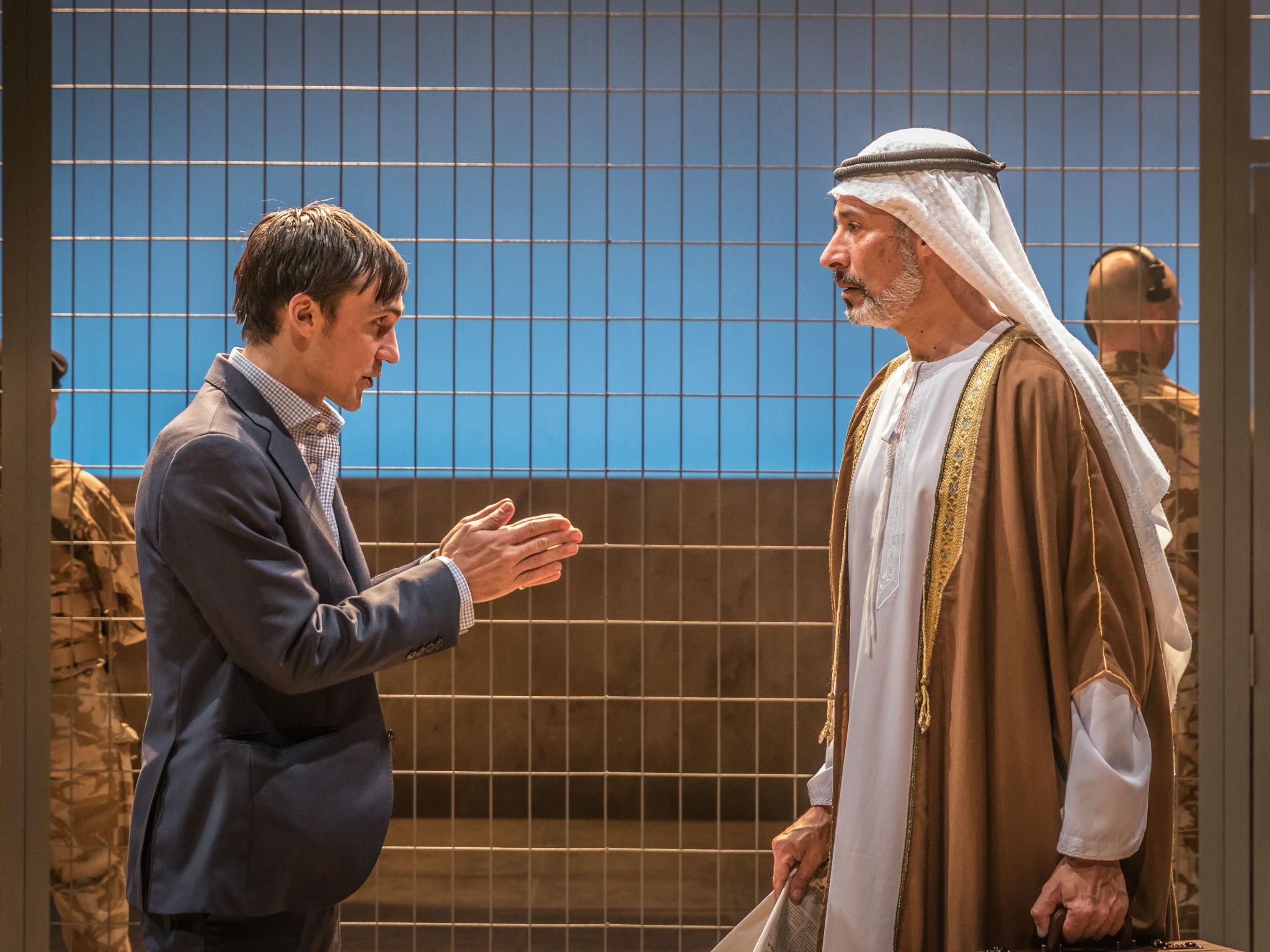Occupational Hazards, Hampstead Theatre, London, review: A gripping, thought-provoking, sometimes gruesomely funny play
This play is based on the memoir by the former British diplomat Rory Stewart, who was posted to a province of the newly liberated Iraq to serve as governor

Your support helps us to tell the story
From reproductive rights to climate change to Big Tech, The Independent is on the ground when the story is developing. Whether it's investigating the financials of Elon Musk's pro-Trump PAC or producing our latest documentary, 'The A Word', which shines a light on the American women fighting for reproductive rights, we know how important it is to parse out the facts from the messaging.
At such a critical moment in US history, we need reporters on the ground. Your donation allows us to keep sending journalists to speak to both sides of the story.
The Independent is trusted by Americans across the entire political spectrum. And unlike many other quality news outlets, we choose not to lock Americans out of our reporting and analysis with paywalls. We believe quality journalism should be available to everyone, paid for by those who can afford it.
Your support makes all the difference.It's September 2003 and Rory Stewart, a 30-year-old former British diplomat turned Tory MP, finds himself posted to serve as the governor of the Maysan province in the south of the newly liberated Iraq. In an Evelyn Waugh novel, Stewart would have been elevated to this position through a farcical case of mistaken identity and turn out to be constitutionally unsuited to the role. In fact, this was a young man who had already walked 6,000 miles across Iran and Afghanistan, producing an award-winning book (The Places in Between) about his adventures in the wild central Afghan mountains. When Iraq was invaded, he submitted his CV and – on receiving no reply – struck out for Baghdad to search for a job on the spot.
All the same, there is an intermittent tinge of Waugh – not in any cynicism about youthful idealism, but in the preposterous amount of reconstruction this figure is expected to expedite.(from building a police force to organising a democratic council to elect a local governor) and in the black absurdities of the situation. By what logic can an unelected foreigner, backed up by British tanks, impose “democracy” on a region whose tribal enmities have been vastly underestimated?
From Stewart's acclaimed memoir of the same name, Stephen Brown has fashioned this gripping, thought-provoking, sometimes gruesomely funny play which runs 110 minutes without an interval. Performed against Paul Wills's design of sliding concrete walls with frazzling florescent tubes, Simon Godwin’s production boasts a terrific central performance from Henry Lloyd-Hughes. Switching easily between direct address and dialogue, he radiates the intelligence, charm and sometimes naive idealism and stubbornness of Stewart who here, in front of an ever-denser collage of yellow post-it notes, describes the difficulties of arriving at a representative council as akin to working out “the table plan for the world's most awkward wedding”.
The excellent John Mackay doubles as Paul Bremer, US leader of the Coalition Provisional Authority, with his unrealistic talk of building “a multi-ethnic, decentralised prosperous state, based on human rights” and the British colonel who is disgruntled by Rory's attempts to include in the negotiations Seyyed Hassan (Johndeep More) the hardline Sadrist leader whose followers have just murdered six British policemen. “You say these people want democracy. They want to be not fucking dead,” he ripostes.
The colonel favours the ostensibly more moderate Karim (Silas Carson), the so-called “Prince of the Marshes”. Both these rivals fought bravely against Saddam. But they have a deep-seated loathing for each other. Stewart does not go in for theatrical flourishes but he permits himself one at the gathering where he temporarily reconciles the pair. Valuable artefacts are being smuggled for safety out of the museum and the young governor shows the assembled company a 5,000-year-old clay tablet that demonstrates that this civilisation was using an alphabet and creating laws 85 generations before anyone in America or Britain began to write. If this arm-twisting gesture does the trick for a while, we later learn – from a museum historian – that what the brandished tablet actually said was “78 goats”, proving (in his view) that language was invented to assert jealous ownership. For Stewart, though, it reveals “a kind of contract”, designed to pre-empt fights breaking out over the said goats.
The ace performances have a vivid story-telling vigour a swift knack of suggesting three-dimensional life. It's only by conveying the depth of culture within the Iraqi characters that you can get the measure of the intractable problems that arise when two visions of the world clash. Aiysha Hart is keenly impassioned as Rana, an Iraqi woman running a project to teach local women to sew, who can already see the signs of a resurgent misogynist repression. Nezar Alderazi snags your heart as Rory's translator who informs us that in 2006, almost certainly by members of an Islamist militia, he will be dragged from his car and shot dead. The coalition certainly did not leave behind a multicultural democracy. But does that failure mean that we should stand by and writhe from all thoughts of intervention in the future? That's the question that is left hanging in the air at the end of this compelling piece.
Join our commenting forum
Join thought-provoking conversations, follow other Independent readers and see their replies
Comments